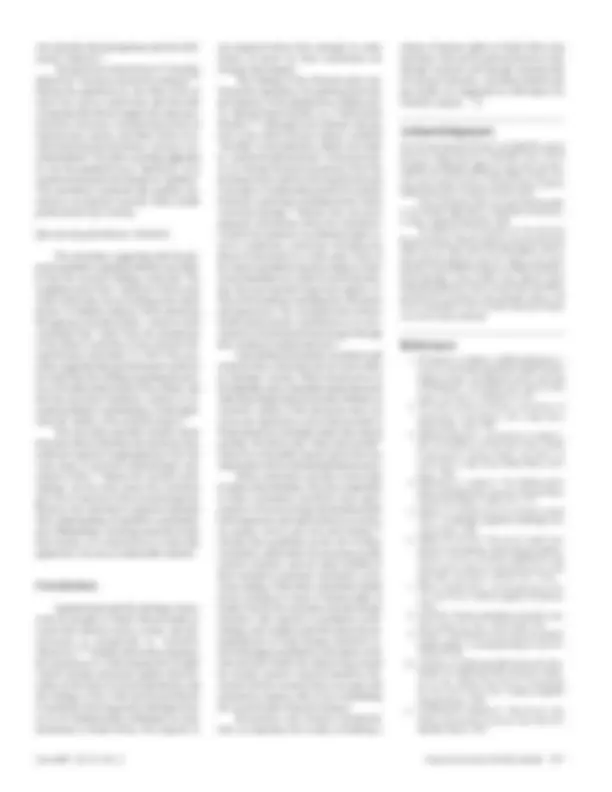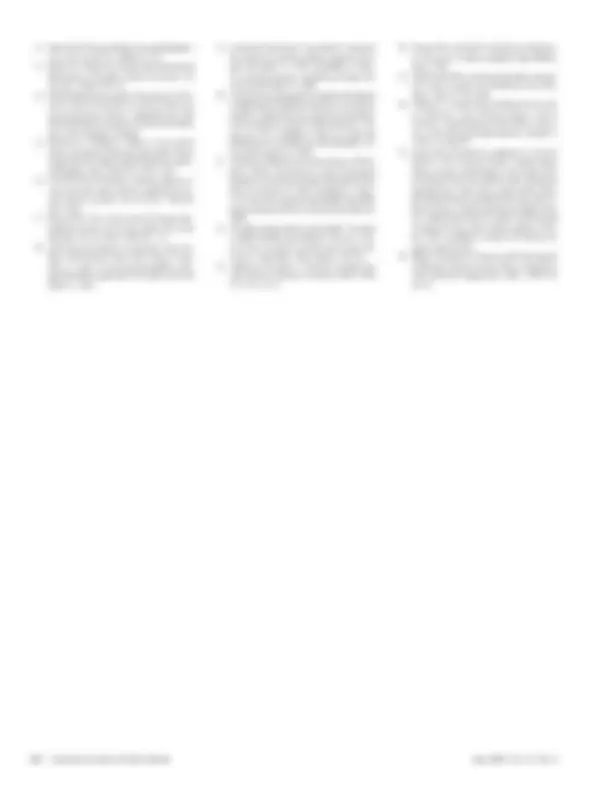




Study with the several resources on Docsity

Earn points by helping other students or get them with a premium plan


Prepare for your exams
Study with the several resources on Docsity

Earn points to download
Earn points by helping other students or get them with a premium plan
Community
Ask the community for help and clear up your study doubts
Discover the best universities in your country according to Docsity users
Free resources
Download our free guides on studying techniques, anxiety management strategies, and thesis advice from Docsity tutors
The challenges faced by researchers jeanelle de gruchy and simon lewin in obtaining approval from an ethics committee for research into human rights abuses of gay men and lesbians in the south african defence force during the apartheid era. The authors argue that institutional heterosexism and a reluctance to explore professional abuses of power continue to shape health research in south africa. The document also highlights the importance of ethics committees promoting the public interest and ensuring that relevant research is conducted.
What you will learn
Typology: Lecture notes
1 / 4

This page cannot be seen from the preview
Don't miss anything!



Prevailing state and institutional ide- ologies regarding race/ethnicity, gender, and sexuality help to shape, and are in- fluenced by, research priorities. Research ethics committees perform a gatekeeper role in this process. In this commentary, we describe ef- forts to obtain approval from the ethics committee of a large medical institution for research into the treatment of homo- sexual persons by health professionals in the South African military during the apartheid era. The committee questioned the “scientific validity” of the study, viewing it as having a “political” rather than a “scientific” purpose. They ob- jected to the framing of the research topic within a human rights discourse and ap- peared to be concerned that the research might lead to action against health pro- fessionals who committed human rights abuses against lesbians and gay men dur- ing apartheid. The process illustrates the ways in which heterosexism, and concerns to protect the practice of health profes- sionals from scrutiny, may influence the decisions of ethics committees. Ethics that exclude research on lesbian and gay health cannot be in the public interest. Ethics committees must be challenged to examine the ways in which institu- tionalized ideologies influence their de- cision making. ( Am J Public Health. 2001;91:865–868)
June 2001, Vol. 91, No. 6 American Journal of Public Health 865
Jeanelle de Gruchy is with the Health and Human Rights Project, University of Cape Town and the Trauma Centre for the Victims of Violence and Tor- ture, Cape Town, South Africa. Simon Lewin is with the Health Systems Research Unit, Medical Research Council of South Africa, Cape Town, South Africa. Requests for reprints should be sent to Jeanelle de Gruchy, BA, MBChB, MA, Southern Derbyshire Health Authority, Derwent Court, Stuart St, Derby, DE 2FZ, UK (e-mail: jeanelle.degruchy@ntlworld.com). This commentary was accepted February 6,
Note. The views expressed are the responsibil- ity of the authors.
Central to South Africa’s democratic trans- formation have been attempts to understand how and why apartheid human rights abuses occurred. The Truth and Reconciliation Com- mission was established to document gross human rights abuses during apartheid, to con- sider amnesty for those accused of such abuses, and to propose reparations for the victims. The Truth and Reconciliation Commission health sector hearings detailed how apartheid ideology “permeated the entire health sector, distorting and corrupting health professional training, re- search and service delivery,”1(p976)^ resulting in large-scale human rights violations.2,3^ Health professional institutions, including research or- ganizations, not only failed to address institu- tionalized racism, sexism, and heterosexism within health provision but also actively per- petuated a myth of “scientific objectivity” and political “neutrality” that served to bolster this profoundly unjust system.^4 In South Africa, the close relations be- tween racist ideologies and health research have begun to be documented.2,3,5,6^ Prevailing state and institutional ideologies regarding race/eth- nicity, gender, sexuality, and so on help to shape, and are in turn influenced by, research priorities.7,8^ King9(p32)^ noted that in the United States, “The systemic exclusion of minority populations from biomedical and socio- behavioural research... represents a form of institutional racism.” Lesbians and gay men are a minority group who often have also been excluded from health and other research. In- deed, Chauncey et al.10(p1)^ have commented that research on the history of homosexuality “has been constrained by the intolerance of gov- ernments and academics alike.... Repression and marginalization have often been the lot of historians of homosexuality as well as of ho- mosexuals themselves.” Attempts to censor re- search on gay and lesbian issues are a form of institutional heterosexism—a systematic cast- ing of homosexuality as inferior to heterosex- uality rather than discrimination at an individ- ual level.11, Research on gay and lesbian health can be viewed as socially sensitive research be- cause of the potential social consequences for the participants, the class of individuals repre- sented in the research, or both.^13 Such research often highlights the complex ideologic and eth- ical issues underlying the research enterprise. In this commentary, we describe our difficul- ties in obtaining research ethics committee (or
institutional review board) approval for research into human rights abuses of gay men and les- bians in the South African Defence Force by health professionals during the apartheid era. We use this case study to raise concerns that in- stitutional heterosexism and a reluctance to ex- plore professional abuses of power continue to shape health research in South Africa.
Since the research-related atrocities of the Nazi regime, there has been increasing aware- ness of the need to consider ethical issues in research. This has been formalized through the promulgation of government regulations, the development of professional guidelines for con- ducting research, and the growth of research ethics committees. These committees perform a vital gatekeeper role in assessing the ethics of research proposals and approving only those that meet the standards laid down in the Dec- laration of Helsinki.^14 Ethics committees also “have a wider responsibility to promote the public interest by helping to ensure that relevant research is done”15(p1390)—and, by extension, determining which research does not serve the public interest and therefore should not be done. However, the converse also needs to be considered: to what extent ethics committees may act against the public interest by prevent- ing or retarding research on ideologic grounds. A literature search of MEDLINE and the International Bibliography of the Social Sci- ences found surprisingly few articles on the conduct of research ethics committees. A few studies suggested that ethics committees are “wary of [socially sensitive] research and ap- pear to resolve the dilemma posed by [it] by
866 American Journal of Public Health June 2001, Vol. 91, No. 6
finding fault more often with [these] proto- cols.”13(p49)^ An experimental study by Ceci and colleagues,^16 in which 157 university institu- tional review boards reviewed 1 of 9 hypo- thetical research proposals, found that socially sensitive protocols were twice as likely to be re- jected as were similarly designed nonsensitive protocols. Benson17(p6)^ described this study:
Ethically nonproblematic and nonsensitive proposals nearly always received IRB [in- stitutional review board] approval. However, only 40–50% of ethically nonproblematic, but socially sensitive , proposals were like- wise approved.... IRB disapproval of these proposals were [sic] frequently justified by pointing to alleged methodological defi- ciencies (for example, inadequate sample size), while nonsensitive proposals rarely re- ceived such criticism.
Commenting on this study, Sieber and Stanley13(p49)^ noted that
the socio-political ideologies of the review committee members appeared to be reflected in the commentary about the rejected proto- cols. Therefore, although there is nothing that forbids research on sensitive topics, there are powerful forces working against the conduct of such research.
The following case study outlines the re- sponses of a research ethics committee to a po- tentially sensitive topic: research on lesbian and gay health in the military. By presenting this case study, our intention is not to identify or tar- get a particular institution but rather to illustrate issues that pertain to many research institutions.
As in military institutions worldwide, many lesbians and gay men have served in the South Africa Defence Force. A submission to the Truth and Reconciliation Commission re- ported on the use of conversion or reparative therapy by health professionals on several gay conscripts between 1967 and 1978 ( The Health and Human Rights Project: Professional Ac- countability in South Africa. Final submission to the Truth and Reconciliation Commission [unpublished report]; Cape Town, South Africa; December 1997). Conversion therapy is a term used to describe treatments to convert a per- son from a homosexual to a heterosexual ori- entation.^18 No evidence indicates that such ther- apies can change sexual orientation, and their use is not supported within the field of mental health.19–21^ The Truth and Reconciliation Com- mission submission noted that “the context was clearly one of being experimented upon, and consent appeared to have been obtained under circumstances of coercion” ( The Health and Human Rights Project: Professional Account- ability in South Africa. Final submission to the Truth and Reconciliation Commission [un-
published report]; Cape Town, South Africa; December 1997:46) (also reference 22). It was believed that the events of this period should be further researched, because they presented an underexamined area of human rights violations and raised important issues of health profes- sional accountability. A collaborative team, including academic researchers and activists involved with gay and lesbian organizations, developed the aVersion Research Project. The main aims of the re- search were to explore how health profes- sionals in the South African Defence Force treated homosexual persons and thereby to ex- amine how the military and psychiatry con- structed homosexuality as abnormal behavior. The research was to use qualitative method- ology. In-depth, semistructured interviews were planned with gay men and lesbians who had received medical treatment in the military, their family and friends, health professionals who may have been involved directly or indi- rectly, and military personnel. Informed, writ- ten consent would be obtained for the inter- views, which would be confidential and anonymous. Theinitialresearchprotocolwasextensively discussed in consultation meetings at several ac- ademic institutions, which included input from nongovernmental organizations serving the les- bian and gay community.Thereafter, it was sub- mitted to the research ethics committee of a large medical research institution. Most members of the committee were White male scientists and health professionals appointed by the governing body of the research institution.The committee twice rejected the proposal, raising several dif- ferent objections in their written responses.The researchteamwastheninvitedtoameetingofthe committee at which problems with the protocol werediscussed.Followingthismeeting,theethics committeeformallyapprovedthestudy,although with several provisos.
Abuse: A Problematic Concept?
The committee took issue with the use of the word abuse in the proposal, suggesting that it was an unsubstantiated assumption and that it implied wrongdoing by health profession- als. They questioned whether the conversion treatment given to gay conscripts in the military constituted an “abuse” because (1) “these abuses were a common military phenomenon all over the world at that time” (letter from the chairperson of the ethics committee to the aVer- sion Research Project, December 15, 1997), and (2) they did not contravene South African law. One member of the committee suggested
that to scientifically prove abuse, the evidence would have to be tested in a court of law. There seemed to be little concern with how the treatments were experienced by those receiving them, which was the main focus of the study. To our knowledge, the committee made no attempt to consult with lesbian and gay organizations that could have represented the viewpoint of that section of society. Indeed, we perceived that the ethics committee was un- comfortable with the subject matter of the re- search because it involved gay men and les- bians. Given the composition of the committee, it is possible that heterosexist values influenced decision making and led members to see con- version therapy as an acceptable medical treat- ment because it would address the “problem” of homosexuality. Our position was that although a particu- lar medical practice may have been profes- sionally or socially sanctioned (although it is debatable whether this was the case in the period covered by our research), this does not preclude it from being considered abusive at the time or subsequently, particularly if treatment was given without consent or under conditions in which in- formed consent was problematic. Second, we thought that the committee’s apologist attitude failed to distinguish between law, which may be country specific and, as in the case of apar- theid South Africa, clearly discriminatory, and human rights, which reflect universal moral val- ues. It was disturbing that members of the com- mittee appeared to hold the view that because acts were “legal,” they did not contravene the rights of those subjected to them. Unfortunately, this view is held by many SouthAfrican health and other professionals.^3 In its final approval of the research proposal, the ethics committee made the proviso that words such as abuse and violations be used more carefully and that al- leged be added where appropriate (letter from the chairperson of the ethics committee to the aVersion Research Project, March 16, 1998).
Separating Research From Politics
The committee objected to the presenta- tion of the research topic as a human rights issue. They questioned the “political” nature of this sort of research and also challenged whether “a better understanding of society could be gained through a descriptive study” (letter from the chairperson of the ethics com- mittee to the aVersion Research Project, Sep- tember 4, 1997). Concerns were expressed that the research could be viewed as an investiga- tion into the practices of health professionals in the military “for retribution purposes,” linked to investigations initiated by the Truth and Rec- onciliation Commission. For these reasons, the proposed research was seen as having a “po- litical” rather than a “scientific” purpose and
868 American Journal of Public Health June 2001, Vol. 91, No. 6